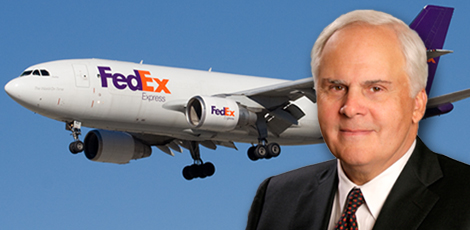Fred Smith of FedEx slams ‘protectionist’ US trade policy
26 / 06 / 2019

FedEx founder Fred Smith
FedEx founder Fred Smith has renewed his criticism of President Trump and his administration’s simmering trade dispute with China, saying that the US had become “protectionist,” defined as: “I will make everything I need in my own borders”.
Smith, chairman and chief executive of the US parcels and logistics giant, told a 2019 Q4 analysts conference call that US trade policy could be summarised as: “I don’t need to import things and quite frankly don’t particularly need to export them, despite the fact that 95% of the world’s population is outside the United States.
“So we have become a protectionist country. We don’t agree with the Chinese position on trade either and been very vocal about that, which is mercantilist: I would like to sell to you, but I won’t buy from you on a reciprocal basis.”
Smith also spoke about the FedEx decision to sue the US Department of Commerce on its Export Administration Regulations (EAR) and the logistics operator’s ambition to be the “low cost producer in the e-commerce space for [US] residential deliveries,” the latter remarks clearly aimed at Amazon after FedEx confirmed it will ditch its domestic US business with the global e-tailer.
Alan Graf, FedEx chief financial officer, said: “Our strategic decision not to renew the FedEx Express US domestic contract with Amazon will also be a near-term headwind, which we expect to reverse to a positive in FY 2021, as we replace the lost volume and optimize the network.”
In a wide-ranging business review, Smith said that the July 2017 NotPetya virus cyber-attack, which hit TNT Express operations worldwide after its systems became infected in Ukraine, “was the largest single attack by a state-sponsored entity in history of the world. It has put the Ukraine on its knees”, adding: “Had it not been that TNT had been a subsidiary of FedEx, the company would’ve been bankrupt. It would have just gone out of business.”
FedEx said that fiscal 2019 was a “challenge and a change” for the company in an environment of weakening international revenue growth, due to a slowdown in global trade, the after effects on TNT Express as it recovered from the cyber attack and “continued rapid growth of e-commerce demand”.
FedEx, said Smith, will “grow substantially” its e-commerce business and he noted that improved profitability in this sector requires greater efficiency in delivering residential packages: “We have sound initiatives to steadily improve our cost to serve this market.”
Raj Subramaniam, president and chief operating officer, said that it expected FedEx Ground to become “the low cost last mile provider in the industry”. In 2020, FedEx Ground will deliver seven days a week for 80% of US GDP, it was stated.
The company dismissed reports in the Wall Street Journal that it would cut the prices of its air express network for some customers including guaranteed two-day air services at the same price as its ground division.
FedEx said that it hadn’t made any pricing changes recently and that demand was growing since price changes made last year.
On the market outlook, FedEx expects that global trade disputes and low global growth rates will create “significant uncertainty” for its express business, and it will be cautious in projecting fiscal year 2020 earnings for that segment.
Referencing the legal against the US government, Smith said that the misrouting of a Huawei phone was only “peripherally involved” in the Department of Commerce lawsuit, and was focused instead on important export controls.
FedEx legal general counsel Mark Allen said that FedEx “cannot know the contents” of the 15m packages it handles daily and “whether those contents comply with the complex EARs”.
The parcels company hopes to reach “a common sense” agreement to create a safe harbour if FedEx has no knowledge of an apparent EAR violation.
Asked by one analyst about the possible effect of US trade tariffs on FedEx’s Guangzhou hub in China, Smith answered: “We’ve been a good corporate citizen in China for decades and we are completely dedicated to compliance in China. We have expressed that to them and reinforced it.”
He added: “We’ve cooperated fully with the China state postal Bureau and their investigation of the two misrouted packages and the erroneously returned package.”
Smith said that the Guangzhou hub is a “huge part” of the Pearl River Basin economy: “So we hope there’s not going to be any further deterioration in US-China trade relations.”














